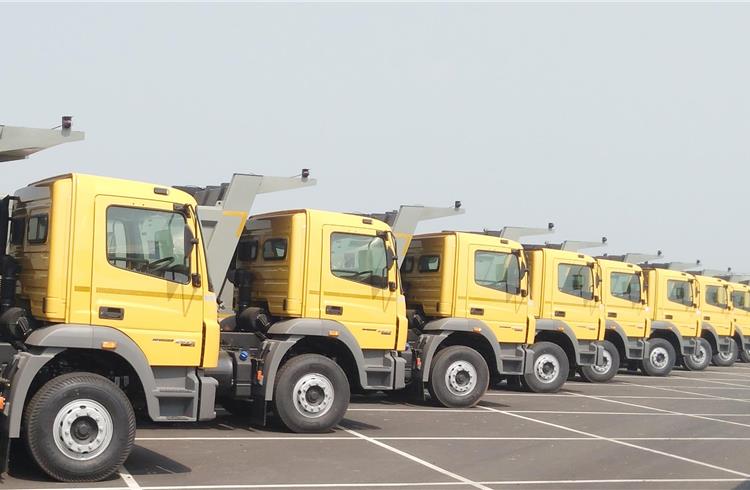Demand for cowl trucks in India to decline sharply: DICV
Daimler India Commercial Vehicles says growing consumer preference for modern HCVs with factory-fitted cabins will see demand for cowl trucks dwindle in the near future.
The trucking scenario in India is seeing rapid change, both in products as well as owner preferences. Over the decades, cowl trucks were the preferred buys for long-distance haulage application. Cowl trucks essentially are trucks which do not come with a built-up cabin and coach built around the vehicle chassis.
The traditional way for freight operators in India was to buy a cowl truck and make the cabin locally, a phenomenon driven essentially by cost savings. However, these locally made cabins are qualitatively poor and very often found wanting on the crashworthiness front and are also challenging to service. What’s more, delivery of a cowl truck takes time as a customer has to wait for a couple of weeks. A not-so-comfortable cabin translates into lower driver efficiencies, repairing of cowl truck is not an easy affair and translates into lower uptime.
The past few years, when global majors like Daimler Trucks, Scania, Volvo and MAN have entered the domestic market, have seen both local and overseas OEMs offer modern trucks with factory fitted cabins and coaches at competitive prices. Recognising long-term benefits from OEM standard products, the market is now gradually moving towards modern cabs and customers are looking for modern, factory fitted trucks that enable speedier turnaround time and greater efficiencies.
Daimler India Commercial Vehicles (DICV), which manufactures only fully built factory fitted trucks in India for its entire product portfolio, says that cowl trucks lack safety, have longer downtime and also do not enable smooth serviceability. Compared to cowl trucks, modern cabin-fitted trucks can ply non-stop for 24 hours ensuring higher turnaround time for fleet operators and greater profitability.
Speaking to Autocar Professional, Erich Nesselhauf, managing director and CEO, DICV said, “I have not seen cowl trucks in any other country so far and it’s an Indian phenomenon. Nobody in the world accepts this. Why do Indian customers have to accept this? The cowl market, which was 60 percent a few years ago, has shrunk to 40 percent and will continue to diminish further.”
“The price difference between a modern truck with factory fitted cabin and a cowl is marginal but they offer many benefits including safety and efficiency. In trucks, the value of the truck is not very important as is the running cost considering the truck owner spends 50 percent of the cost on fuel. So a truck with higher fuel efficiency and better pickup are more important. The cost factor will not work for a very long time and customers will see the benefits of a modern cabin,” said Nesselhauf.
At present, the medium-duty truck segment in India has fully moved to factory fitted cabins. It is similar story in the construction truck segment, which has also seen a higher uptick in the modern cabin as they operate in tough conditions.
“Cowl trucks are largely preferred in the long haul but I see them really declining which is good for India. If India decides to implement the Truck Code, then the cowl market will simply die as it will never fulfil any crash regulations,” he added.
In India, over the last decade, local manufacturers including Tata Motors, Ashok Leyland and VE Commercial Vehicles have begun been offering modern trucks with high-quality cabins and also meeting safety regulation and rollover protection. But they also offer cowl trucks for a section of the customers which are value driven.
The winds of change are already impacting the Indian trucking industry, which is populated by cost-conscious fleet operators. With GST resulting in the abolishing of checkposts across over 25 states in the country, fleet owners are already reporting 20-30 percent improved turnaround times which in turn positively impacts the vital total cost of ownership (TCO) growth mantra. With CV manufacturers fast embracing new technologies and offering higher safety in their modern offerings, cowls could soon be a thing of the past in the Indian marketplace. All that is needed is a higher level of customer awareness across the country and a nudge from the enforcement and regulatory authorities in the form of a code.
Also read: Daimler India CV launches Euro 5-compliant BharatBenz medium-duty trucks
RELATED ARTICLES
Bosch hydrogen engine tech-powered truck to be on Indian roads this year
The global supplier of technology and services is betting big on both electromobility and hydrogen. While announcing the...
IIT Bombay inaugurates Arun Firodia Research Floor
IIT Bombay, one of India’s top technical and research institutions, honours Kinetic Group chairman Dr Arun Firodia, one ...
Maruti Suzuki expands capacity at Manesar plant by additional 100,000 units
New assembly line at Plant A expands total manufacturing capacity at the Manesar plants to 900,000 units per annum. Alon...





 21 Sep 2017
21 Sep 2017
 51169 Views
51169 Views





 Autocar Pro News Desk
Autocar Pro News Desk




